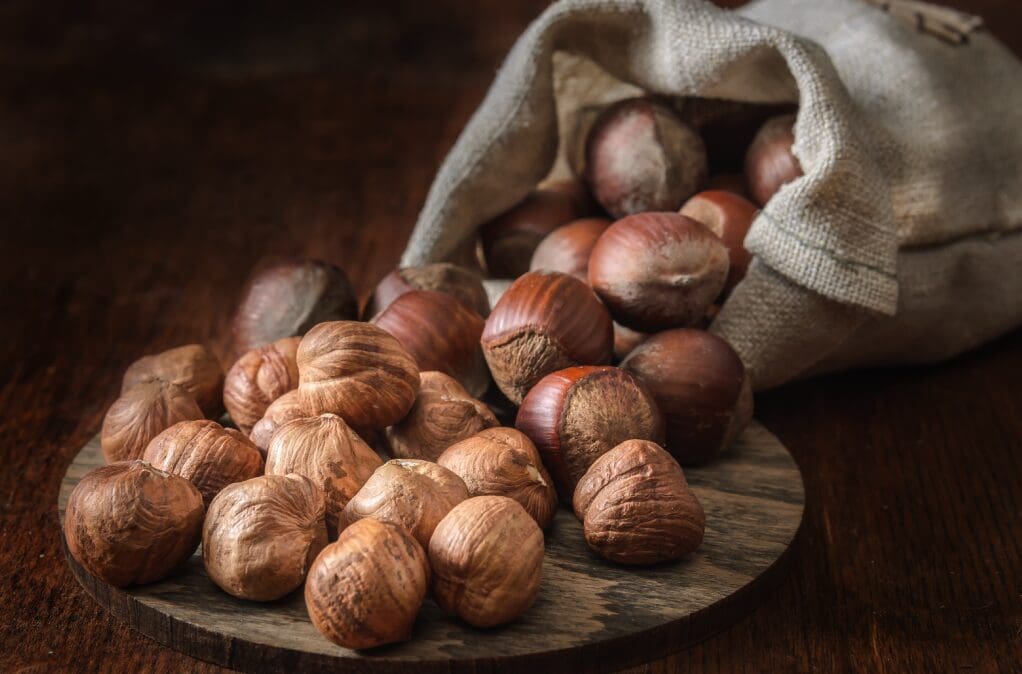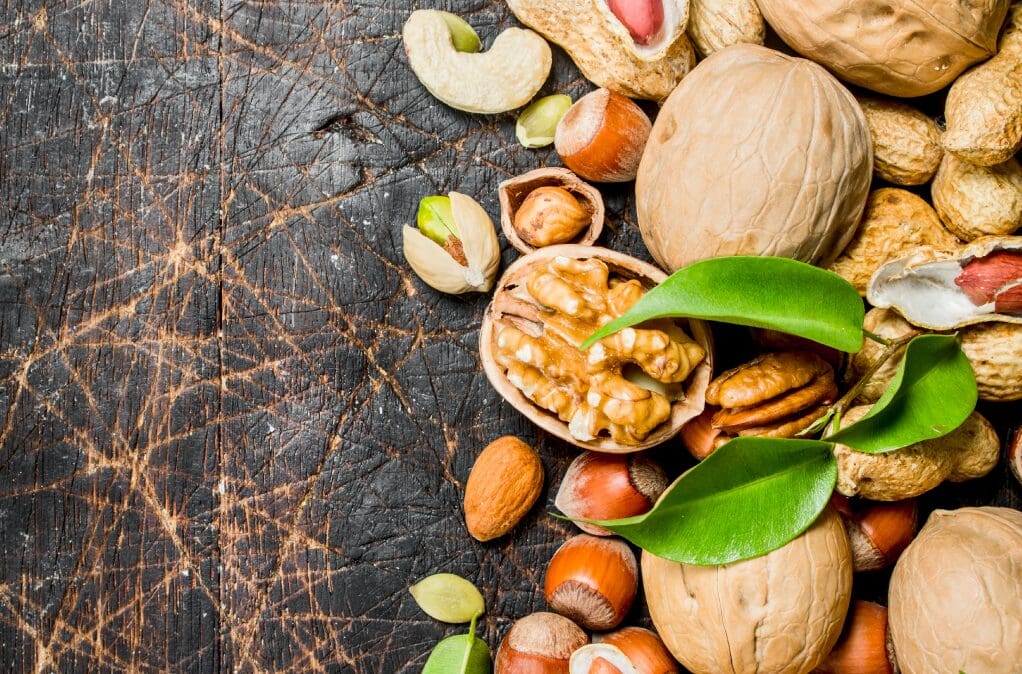How long have nuts been part of the human diet?
Are nuts good for you? Are humans supposed to eat nuts? If our history is any indicator, the answer is “yes.” Nuts have been a part of the human diet for a very long time. A dig in Iraq uncovered evidence that humans were eating them as far back as 50,000 B.C. Archeological evidence shows walnuts dating back to 7000 B.C.– the Romans considered them “food for the gods.” Wild hazelnuts were a favorite treat enjoyed by Vikings, and 6,000-year-old pecan shells were found in Texas. 34 Amazing Nut Facts. [This article, “Are Nuts Good For You? The Noble Nut Is A Nutrient-Rich Snack” was originally published in News7Health]
What is a nut – how are they different from seeds?
The difference between nuts and seeds can be confusing. Botanically, nuts are classified as fruits with a hard shell that protects their edible kernel. Nuts are different than seeds because the nutshell does not open to release the seed (you know how you have to use a nutcracker to get at those tasty insides), whereas seeds come from fruits that naturally release the seeds from their shells. However, common usage of the term “nut’ includes many non-nuts (botanically speaking). This article will focus on what are commonly called “nuts” – an energy-dense food full of nutrition. You can find the strict botanical definition of nuts here: Nut (fruit) – Wikipedia.
The overall health benefits of nuts
Nuts are high in protein, fiber, vitamins, minerals, antioxidants, Omega-3 fatty acids, and other nutrients that can positively affect your overall health. They can improve your skin, keep your heart healthy and assist in better brain function. Research shows that the nutrients in nuts can help control diabetes, prevent heart disease and improve cholesterol. https://www.webmd.com/diet/health-benefits-nuts

Nuts are one of the top plant-based protein sources.
Every cell in our bodies contains protein which means humans require a lot of protein to repair and replace those cells. Nuts are an excellent source of protein, providing approximately 9 grams per ounce, and 1/3 cup (about 40 grams) of almonds provides 8.5 grams of protein.
Nuts are rich in antioxidants – a natural cancer shield.
Nuts contain high levels of polyphenols, powerful antioxidants which can help prevent cancer, cardiovascular disease, and age-related macular degeneration (AMD). Antioxidants are compounds that protect cells against damage caused by free radicals. Free radicals are unstable molecules that cause cell damage when interacting with DNA and may promote cancer and other health problems. Free Radical Research in Cancer – PMC Antioxidants can neutralize these free radicals before they do any harm.
According to the USDA (United States Department of Agriculture), pecans take first place for antioxidants among all nuts. USDA: Pecans Still #1 for Antioxidants Among All Nuts | ILovePecans

Which nuts are healthiest?
While all varieties of nuts are healthy, research shows that there can be some differences in their benefits depending upon which area of health is being addressed.
Nuts that are good for your heart
The Omega 3 fatty acids in nuts reduce inflammation related to heart disease, improve your arteries and lower the risk of blood clotting and high blood pressure. Nuts also contain two other substances that positively affect heart health: Plant sterols, which have been shown to help lower cholesterol, and L-arginine, which research suggests also helps lower blood pressure and improve cholesterol and blood vessel health.
Nuts, in general, are good for your heart, but here are a few standouts: almonds, hazelnuts, macadamia nuts, and pecans. Nuts and your heart: Eating nuts for heart health – Mayo Clinic.

Nuts that are good for your brain
Research is ongoing about the effects of the ALA omega-3 fatty acids, other phytochemicals, and neuroprotective agents found in nuts that protect against Alzheimer’s and dementia. Researchers are particularly excited about three nuts: almonds, hazelnuts, and walnuts. Almond, hazelnut and walnut, three nuts for neuroprotection in Alzheimer’s disease: A neuropharmacological review of their bioactive constituents
Which nuts make skin glow?
Almonds, pistachios, and Brazil nuts contain zinc and another powerful mineral called selenium. These minerals can purify your blood, reduce oxidative stress and defend your skin from acne, eczema, and dark spots. The vitamin E in almonds keeps skin hydrated by dilating the blood vessels, and walnuts abound in omega-3 and omega-6 fatty acids that nourish skin and hair.

Are nuts good for you if you have diabetes?
Nuts have an extremely low Glycemic Index (GI).
Diabetics and others who keep track of their glucose levels use a tool called The Glycemic Index. The Glycemic Index (GI) measures how quickly carbohydrates raise blood sugar after eating them. Foods with a high GI cause your blood sugar to rise more rapidly and insulin to spike more than foods with a low GI. This means that you will likely feel hungry sooner after eating foods with a high GI. High-GI foods include white bread, potatoes, rice, pasta, and other starchy carbs. Low-GI foods include whole grains, fruits, vegetables, and nuts. Amazingly most nuts have so few carbohydrates that they can’t be GI tested!
With their high fiber, protein, and healthy fats, nuts assist in regulating blood sugar and keep you feeling full, so you’re less likely to indulge in unhealthy snacks. Additionally, “when nuts are combined with foods rich in carbohydrates, they slow the digestion of the entire meal – resulting in a slower and smaller overall rise in blood glucose levels.” Do nuts have a glycaemic index (GI)? – Nuts for Life | Australian Tree Nuts for Nutrition & Health
The top three nuts to help manage diabetes are walnuts, almonds, and pistachios. Another reason almonds are perfect for people with diabetes is because of their high magnesium content. People with diabetes are often low in magnesium, resulting in weak bones and high blood pressure. Magnesium also helps muscle and nerve function, which can also be damaged by diabetes.
Are nuts good for weight loss?
If you’re on a weight loss program, you may wonder, are nuts good for you on a diet? While it’s true that nuts are high in calories – they are high in the best kind of calories, mostly unsaturated fats (the “good” fats). It seems counterintuitive to think of fats aiding in fat loss, but scientifically it makes sense.
The fats and fiber in nuts leave you feeling satisfied after eating, which helps you eat less. Portion control is key to any diet, so measure the amount of nuts you eat and count them into your caloric intake for the day. “Studies have even found that people who eat nuts frequently are at a lower risk of gaining weight than those who seldom eat nuts.” Health Benefits of Nuts

The healthy way to eat nuts
Nuts are easy to find in grocery stores, convenience stores, and vending machines. The problem is that not all mixes of nuts are healthy. If you want to eat nuts to improve your health, avoid candy-coated nuts, nuts covered in salt, nuts cooked in other types of oils, or dusted with flavorings. Dieticians agree that raw nuts without added sodium are the healthiest choice and are preferred over roasted nuts.
An easy and tasty way to benefit from eating raw nuts is to purchase nut products from a company like TerraNut. (Terranut). This small family-run business sells fully raw, organic nut products. Their “NutPunch” is a nut bar made of raw nuts and superfoods. Nut Punch-Terranut.
However, if you prefer roasted nuts, don’t despair. What matters is that nuts are chosen over far less healthy snacks, and lightly roasted nuts still have plenty of nutrition. “As long as roasted nuts are cooked at between 120-160 degrees Celsius, all the delicate essential fatty acids should remain intact,” Landau says. Raw vs roasted: what’s the healthiest way to eat nuts? – 9Coach
Nuts are a convenient and healthy snack so long as you are portion aware. They’re packed with nutrition and can help you improve your overall health.
For Further Reading
NM The History of Nuts ~ Leavenworth Washington.
The Nut Case: Do They Have Too Much Fat? | ACTIVE
Nuts and Human Health Outcomes: A Systematic Review – PMC
Disclaimer
Important Note:
The information contained in this article is for general informational purposes only, and should not be construed as health or medical advice, nor is it intended to diagnose, prevent, treat, or cure any disease or health condition. Before embarking on any diet or program of nutritional supplementation, it is advisable to consult your healthcare professional in order to determine its safety and probable efficacy in terms of your individual state of health.

